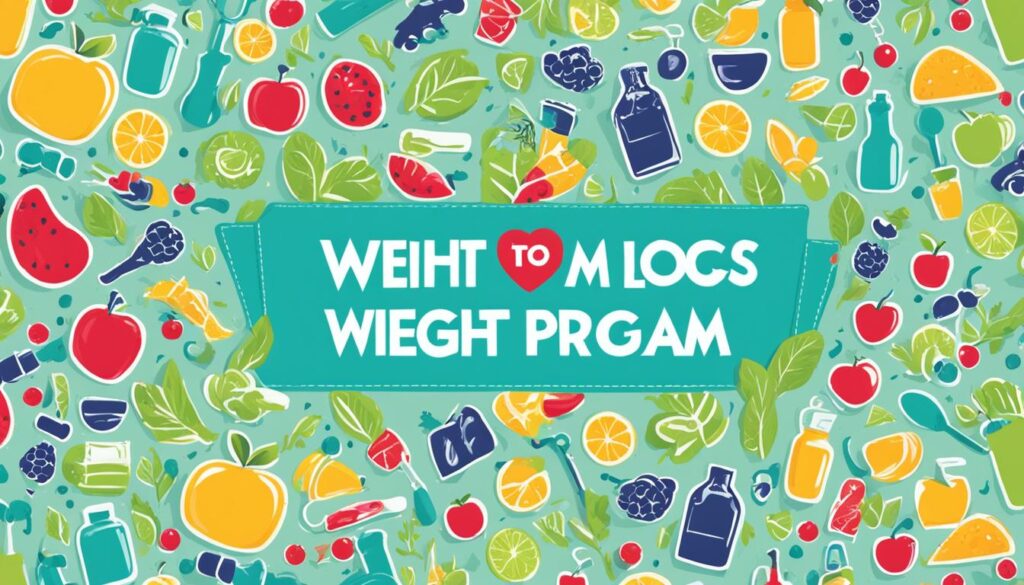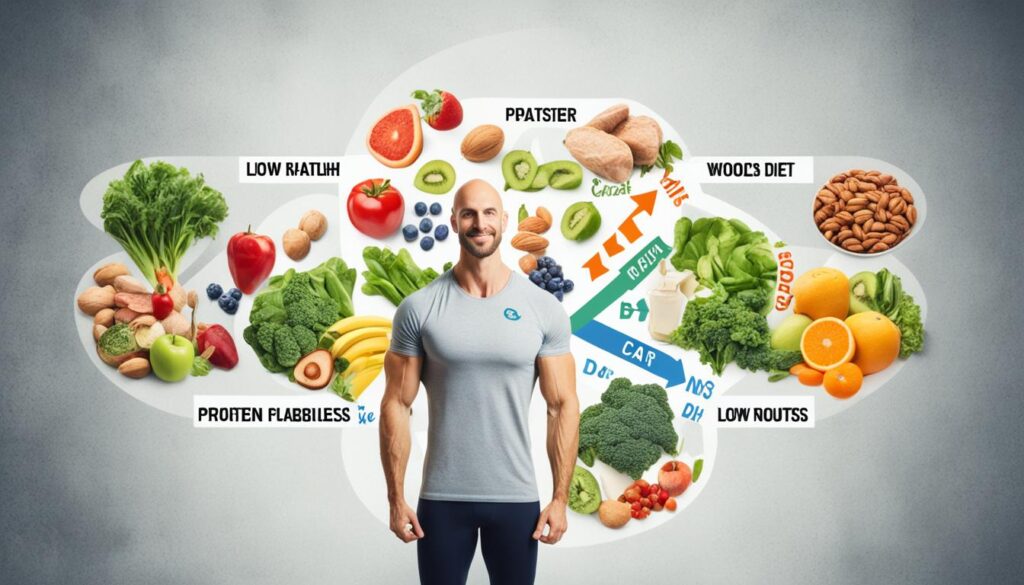According to the Harvard T.H. Chan School of Public Health, about 70% of adults in the United States are overweight or have obesity. To address this issue, doctors recommend various diet paths for weight loss. In this article, we will explore the top 10 daily diet paths that doctors recommend for weight loss, including weight loss diet plans, healthy eating tips, and medical weight loss programs. These diet paths have been proven to be effective in helping individuals achieve their weight loss goals and improve their overall health.
Key Takeaways
- Doctors recommend 10 daily diet paths for weight loss that have been proven to be effective and improve overall health.
- Weight loss diet plans, healthy eating tips, and medical weight loss programs are among the recommended diet paths.
- Following doctor-approved weight loss diets can help individuals achieve their weight loss goals.
- Effective weight loss meal plans and daily dietary recommendations are essential for successful weight loss.
- Consulting with healthcare providers before starting any new weight loss program is recommended.
Weight loss programs versus diets
Weight loss programs and diets are often used interchangeably, but there is a distinction between the two. A weight loss program helps individuals stick to a specific diet, providing guidance and support throughout their weight loss journey. On the other hand, a weight loss diet refers to the specific dietary prescriptions followed within a program or independently.
Various dietary patterns have been evaluated and compared for their effectiveness in promoting weight loss. These include reduced calorie diets, which involve consuming fewer calories than the body needs to create a calorie deficit, balanced calorie deficit diets that provide a balanced intake of macronutrients while creating a calorie deficit, low fat diets that restrict the consumption of fatty foods, low carb diets that limit the intake of carbohydrates, plant-based diets that focus on consuming predominantly plant-based foods, and the Mediterranean diet that emphasizes whole grains, lean proteins, fruits, vegetables, and healthy fats.
Studies have shown that these approaches are all effective for weight loss, as they promote negative energy balance and a sustainable long term. However, it’s important to note that individual results may vary, and the most suitable dietary pattern for weight loss depends on personal preferences, health conditions, and lifestyle factors.
When choosing a weight loss program or diet, it’s crucial to consider its long-term sustainability. A sustainable weight loss program should allow individuals to feel satisfied and provide balanced nutrition, ensuring they receive all the necessary nutrients. It should also promote gradual weight loss at a rate of one to two pounds per week, as rapid weight loss is often associated with muscle loss and potential nutrient deficiencies.
“The key factor in successful weight loss is finding a dietary pattern that is not only effective but also sustainable over the long term.”
Additionally, a good weight loss program or diet should offer comprehensive support beyond just dietary guidelines. This may include counseling or guidance on behavior modification, physical activity recommendations, and strategies to track progress and adapt eating habits. Such holistic approaches can improve the overall success and maintenance of weight loss.
Every year, U.S. News & World Report releases its highly anticipated diet rankings, providing valuable insights into the best weight loss diets and best overall diets. These rankings are based on comprehensive evaluations of various factors, including effectiveness, ease of use, nutritional value, and long-term sustainability.
The Best Weight Loss Diets for 2024
For individuals focused on weight loss, the following diets have been recognized as the top choices:
- WeightWatchers
- Mediterranean
- Volumetrics
- Mayo Clinic Diet
- DASH
- Flexitarian
- Noom Weight
- Vegan
- Keto
- Atkins
These weight loss diets offer a range of approaches, allowing individuals to choose the one that best suits their preferences and lifestyle. Whether you prefer a flexible eating plan or a specific dietary focus, these top-ranked diets provide proven strategies for achieving weight loss goals.
The Best Overall Diets for 2024
For overall health and well-being, the following diets have been recognized as the best choices:
- Mediterranean
- DASH
- MIND
- Mayo Clinic Diet
- Flexitarian
- WeightWatchers
- Volumetrics
- Dr. Weil’s Anti-Inflammatory
- TLC
These diets emphasize balanced nutrition, good eating habits, and a focus on whole foods. By following these top-ranked diets, individuals can optimize their overall health and well-being.
Remember, while these rankings provide valuable guidance, it is essential to personalize your approach and choose a diet that aligns with your individual health needs and goals. Consulting with a healthcare provider can help ensure that you make informed decisions and embark on a weight loss journey that is safe and effective for you.

What makes a good weight loss program?
When embarking on a weight loss journey, it’s important to choose a program that suits your needs and goals. A good weight loss program should focus on nutrition and lifestyle changes, providing a holistic approach to achieving long-term success. Here are some key factors to consider when selecting a weight loss program:
Nutrition and Lifestyle Changes: A successful weight loss program should emphasize the importance of balanced meals that provide enough nutrients to support overall health. It should promote a sustainable eating plan that is enjoyable and easy to maintain, rather than restrictive diets that may lead to nutrient deficiencies.
Set Goals and Track Eating: A good program should help you set realistic weight loss goals and provide tools for tracking your progress. This can include food diaries, calorie counters, or smartphone apps that make it easy to monitor your daily calorie intake and make necessary adjustments.
Counseling: Guidance and support from trained professionals can be instrumental in helping you develop and sustain healthier eating habits. Look for programs that offer counseling or coaching services to help you overcome challenges and stay motivated throughout your weight loss journey.
Physical Activity: Regular physical activity is crucial for weight loss and overall well-being. A good weight loss program should encourage and provide guidance on incorporating exercise into your daily routine. This can be through personalized workout plans, fitness classes, or access to professional trainers.
Reasonable Weight Loss Goals: It’s important to set realistic expectations when it comes to weight loss. Aim for a gradual weight loss of one to two pounds per week, as rapid weight loss can lead to muscle loss and other health complications. A sustainable weight loss program should prioritize your overall well-being and long-term success.

By considering these factors and choosing a weight loss program that aligns with your needs and preferences, you can increase your chances of achieving your weight loss goals and maintaining a healthier lifestyle.
Top weight loss programs recommended by doctors
Based on interviews with nutritionists and existing research, here are some top weight loss programs recommended by doctors. These programs offer personalized approaches to help individuals achieve their weight loss goals.
| Weight Loss Program | Pros | Cons |
|---|---|---|
| WeightWatchers Points Program | Offers a flexible points system for tracking food intake. Provides a supportive community for accountability and motivation. |
Requires ongoing membership fees. May not be suitable for individuals who prefer a more structured diet plan. |
| Mayo Clinic Diet | Emphasizes a balanced and sustainable approach to weight loss. Provides a wide range of resources and support for healthy living. |
May require dietary adjustments for specific medical conditions. Not designed for rapid weight loss. |
| Noom Weight | Utilizes a behavioral approach to promote lasting lifestyle changes. Offers personalized coaching and support. |
Requires regular use of a smartphone app. May not be suitable for individuals who prefer in-person support. |
| Optavia | Provides portion-controlled meals and snacks for convenience and easy tracking. Offers one-on-one coaching for personalized support. |
Requires purchasing pre-packaged meals and snacks. May not be suitable for individuals who prefer cooking their own meals. |
| TOPS Club | Offers group support and accountability through weekly meetings. Encourages healthy eating and physical activity. |
Requires ongoing membership fees. May not be suitable for individuals who prefer individualized programs. |
| National Diabetes Prevention Plan | Focused on preventing or managing diabetes through lifestyle changes. Provides resources and support for achieving a healthy weight. |
May not be suitable for individuals without diabetes or prediabetes. Requires commitment to long-term behavior changes. |
| Nutrisystem | Offers pre-packaged meals for portion control and convenience. Provides a structured plan for weight loss. |
Requires purchasing pre-packaged meals. May not be suitable for individuals who prefer cooking their own meals. |
| Keyto | Utilizes a ketogenic approach to promote fat burning and weight loss. Provides tools and resources for tracking ketone levels. |
Requires adherence to a high-fat, low-carb diet. May not be suitable for individuals with certain medical conditions. |
| Jenny Craig | Provides portion-controlled meals and personal coaching for support. Offers a structured plan for weight loss. |
Requires purchasing pre-packaged meals. May not be suitable for individuals who prefer cooking their own meals. |
Each weight loss program has its own advantages and drawbacks. To determine the best program for you, consider your specific needs, preferences, and goals. Consulting with a healthcare provider or registered dietitian can help guide you in selecting a program that is safe and tailored to your individual requirements.
Conclusion
In conclusion, doctors recommend various daily diet paths for weight loss. These include following reputable weight loss programs, making healthy eating choices, and seeking personalized programs. It is important to consult a healthcare provider before starting any new weight loss program to ensure it is safe and appropriate for your individual health needs.
Embarking on a weight loss journey can lead to improved health and a leaner physique. With the guidance of doctors and trusted programs, you can achieve your weight loss goals. Remember to personalize your approach and find a daily diet path that works best for you.
Consulting a healthcare provider is crucial, as they can provide personalized recommendations based on your medical history and current health status. They can guide you through your weight loss journey, monitor your progress, and make any necessary adjustments to your program.
FAQ
What are the top 10 diet paths recommended by doctors for weight loss?
The top 10 diet paths recommended by doctors for weight loss include weight loss diet plans, healthy eating tips, and medical weight loss programs.
What is the difference between weight loss programs and diets?
Weight loss programs help individuals stick to a specific diet, while diets refer to different dietary patterns. Some commonly evaluated dietary patterns include reduced calorie, balanced calorie deficit, low fat, low carb, plant-based, and Mediterranean diets.
What are the best weight loss diets according to U.S. News & World Report?
According to U.S. News & World Report, the best weight loss diets for 2024 include WeightWatchers, Mediterranean, Volumetrics, Mayo Clinic Diet, DASH, Flexitarian, Noom Weight, Vegan, Keto, and Atkins.
What makes a good weight loss program?
A good weight loss program should focus on nutrition and lifestyle changes, including balanced meals with sufficient nutrients. It should also set goals and track what is being consumed, provide counseling to develop and sustain healthier eating habits, and include physical activity to maintain a healthy weight and prevent muscle loss.
What are some top weight loss programs recommended by doctors?
Some top weight loss programs recommended by doctors include WeightWatchers Points Program, Mayo Clinic Diet, Noom Weight, Optavia, TOPS Club, National Diabetes Prevention Plan, Nutrisystem, Keyto, and Jenny Craig. Each program has its own pros and cons, and the best program for an individual will depend on their specific needs and preferences.
Do I need to consult a healthcare provider before starting a weight loss program?
Yes, it is important to consult a healthcare provider before starting any new weight loss program to ensure it is safe and appropriate for individual health needs.

